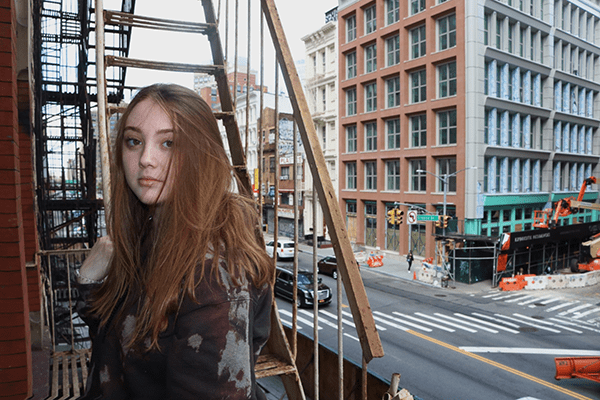Delyth Phillips Launches FORCE NYC Amid Pandemic Blues
By Tina Traster
The coronavirus pandemic slowed down the pace of a Rockland teen’s social life but inadvertently sped up her career goals.
Amid the boredom and frustration of schools being shuttered and friend fests on hold, 17-year-old Delyth Phillips of Tappan jumpstarted a slow-fashion lifestyle business she hopes will amount to doing good for the planet and becoming a profitable entrepreneur. FORCE NYC is a slow-fashion online clothing company that joins the vanguard of manufacturers who are advancing the movement.
Recall the slow food movement, with its home-grown and sustainable tenets leading to the artisanal explosion and humanely raised farm animals. Here, fashion designers young and established, are hitting the brakes on excessive production, overcomplicated supply chains, and mindless consumption. The term was coined by Kate Fletcher, professor of Sustainability, Design, and Fashion at the University of the Arts London’s Centre for Sustainable Fashion, after the slow food movement grew popular.
Phillips describes fast fashion this way: “Any brand that mass produces clothing that’s wasteful.”
Like any other teen, Phillips rocks the latest fashion vibes and does so with elan. But the pandemic offered a wakeup call. Down with a dire case of ennui, Phillips binged online clothing purchases until she smacked into a wall. Instead of hitting another “purchase” button, she used her pent-up energy and restlessness to study how clothing companies were producing fashion. It didn’t take long for the curious teen to learn about unsustainable practices, factory worker exploitation, unethical practices and irreversible environmental harm.
Her journey advanced to the next level in June after enrolling in a pre-college Barnard College course that delved into the intersection of culture and sustainability. She initially rolled out a tee-shirt and has now moved on to tie dyed sweatshirts and sweatpants with 100 percent cotton fabrics sourced from sustainable sellers. Phillips and her team (mom, grandma and friends) screen print, pack and sell from home.
“Clothes don’t last,” she said. “They’re cheaply made, trends die quickly, and yet consumers continue to buy clothes blindly.” Phillips recognizes her own part in this scourge. “I used to shop a lot. I was shopping with the unconscious herd mentality. I wanted to fit in and look like everyone else, to keep up with the latest trends.”
Slow fashion is the backlash to fast fashion. It’s proponents says it’s thoughtful, intentional, and holistic. Slow fashion promotes designing, creating, and buying garments for quality and longevity. It encourages slower production schedules, fair wages, lower carbon footprints, and a goal toward zero waste.
According to a report in The Wall Street Journal, the world’s population acquires nearly 80 billion apparel items annually.
By 2021, the clothing industry in annual global retail sales is predicted to reach $1.4 trillion, an increase of around $106 billion or 8.1 percent since 2016. The fashion industry is responsible for around 10 percent of global carbon build-up, producing 5 times more CO2 than the aviation industry. And apart from textiles, washing solvents and dyeing industries contribute to as much as one fifth of the overall water pollution.
In an act of conscious protest, Phillips deleted shopping apps like Urban Outfitters, Forever21, Dote and Sephora. She then set out to “depersonalize the algorithm so I no longer saw ads suggesting fast fashion.” The teen said constant in-your-face ad promotions from fast fashion companies screamed at her 24/7. The more she learned about sustainability and companies that were taking the lead, the more she left old favorites in the dust.
“By consistently selecting the ‘not interested’ button, I’ve been able to reduce these ads,” she explained. “Finally, I unsubscribed from all mailing lists that recommended fast fashion to me, unfollowed models and brands. Within a week, I started seeing results.”
Now Phillips looks to goodonyou.eco, which lists slow fashion companies such as Reformation, the Classic T-Shirt Company and Honest Basics.
“These are brands FORCE NYC looks up to,” said the clothing entrepreneur.
To date, the fledgling company has raked in about $1,000. Phillips gathers friends these days to model her wares for photo and video shoots. She’s serious about this endeavor for the long haul. She plans to incorporate her company, use it to amplify an important message, and inspire others to think about fashion from a sustainable vantage point.
A comic strip on the back of the company’s t-shirts created by a team of Phillips’ artistic friends featuring a man who’s watching a FORCE NYC commercial with stars in his eyes because he’s craving to get out during the pandemic. Phillips is sending the message that her clothing line isn’t just streetwear – it’s baby steps on the journey toward a better planet. May the FORCE NYC be with you.










